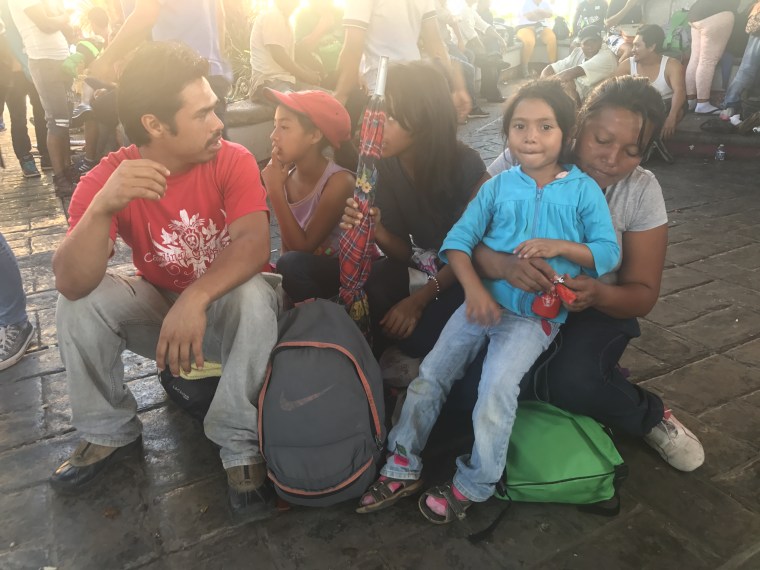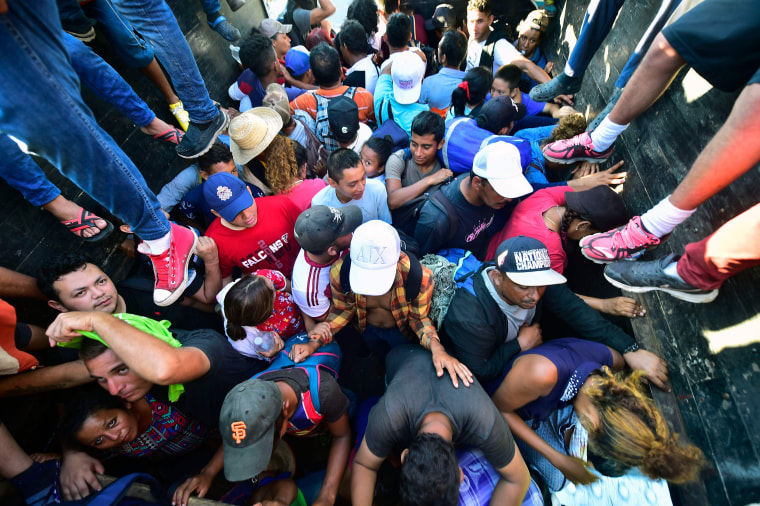TAPACHULA, Mexico — About 7,000 migrants, including many who crossed the Guatemala-Mexico border last week, woke up in a Tapachula park Monday morning to find that the little amount of belongings they had brought with them were soaked in overnight rains.
While donations and aid from the Mexican Red Cross can make up for some of what they have lost on the way, the migrants have a bigger concern to address: whether to stay in Mexico or continue traveling toward the United States. Either way, their goal is to seek refuge.
For some in the caravan, the question is whether to stay in the southern part of Mexico where they spent the night or continue the arduous walk north toward the U.S.-Mexico border.
One mother was debating whether to stay behind and return to Honduras. The journey was too dangerous, she felt.
But others seemed determined to make the grueling trek to the U.S. It’s not clear when they will arrive, but the tentative plan was for them to walk to Arriaga — arriving in several days — and then take trains toward Tijuana.
Several members of the group Pueblo Sin Fronteras, which loosely organized the caravan, said in a press conference on Monday morning that they would help the migrants "process humanitarian visas alongside the proper authorities in charge of doing so."
Since joining the caravan, the morning routine of people like the Lopez family consists of cleaning up the space where they slept, brushing their teeth with bottled water and eating donated bread for breakfast.
Raquel and Manuel Lopez left their home in San Pedro Sula, Honduras, with their three children to seek economic opportunities.
“There’s no food, no jobs. We’re hungry,” the family told NBC. They plan to continue north.
Like the Lopez family, thousands of other migrants were getting ready to leave Tapachula.
President Donald Trump posted a series of tweets blaming Democrats for the caravan and threatening to cut foreign aid to Guatemala, Honduras and El Salvador.
Trump also tweeted that “criminals and unknown Middle Easterners are mixed in.” From a total of over 400,000 crossings, about 3,000 people from the Middle East and Africa have been apprehended at the border during the last fiscal year, according to NBC News reporter Julia Ainsley, who spoke with officials at the Department of Homeland Security.

The migrants, mainly from Honduras, Guatemala and El Salvador — referred to as the Northern Triangle of Latin America — are part of a caravan of people who for the most part are fleeing poverty and violence in their communities.
Honduras is among the countries with the world's highest rates of murder, violence and corruption, according to Human Rights Watch. Roughly one in five Hondurans live in extreme poverty, according to the World Bank. It is also the Latin American country with the highest level of economic inequality.
The Northern Triangle is home to transnational gangs such as MS-13 and the 18th Street Gang, both founded in Los Angeles, as well as drug cartels and criminal organizations with origins in the area’s civil wars. Over the years, rampant crime and gang activity in these countries have fueled waves of immigration to the U.S.; while many Central Americans living in the U.S. have fled gang violence, others are political or economic exiles.
Last week, Trump said via Twitter that he would “call up the U.S. Military and close our southern border” if Mexico doesn’t stop the caravan from coming to the U.S.
Nicole Acevedo reported from New York, and NBC producer Natalie Valdés and NBC News correspondent Gabe Gutierrez reported from Mexico.
FOLLOW NBC LATINO ON FACEBOOK, TWITTER AND INSTAGRAM.




